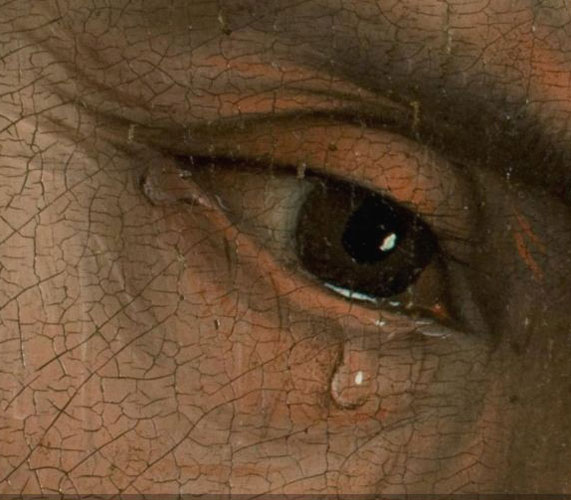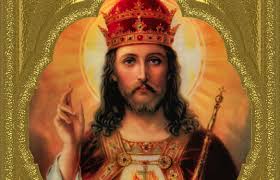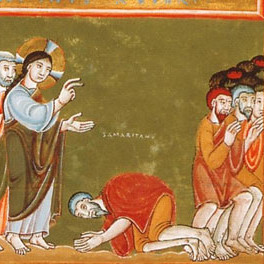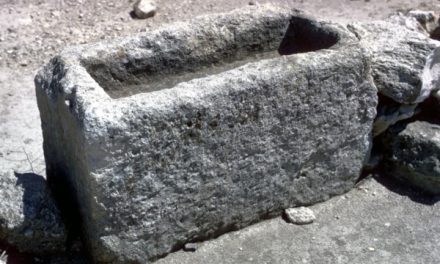Saint John’s account of the resurrection of Lazarus famously contains the shortest verse in the entire Bible: “Jesus wept.”
As well as being the shortest verse, I think it’s one of the most powerful. It’s indicative of the Lord’s love for his friends. Their sorrow is his sorrow. It’s indicative of his love for us. Our sorrow is his sorrow.
But the raising of Lazarus also shows us how Jesus treats his friends:
“Jesus loved Martha and her sister and Lazarus, yet when he heard that Lazarus was ill he stayed where he was for two more days before saying to the disciples, ‘Let us go to Judaea.’” (Jn 11:5-7)
Jesus could have travelled to Bethany immediately, and healed his friend before Lazarus died. He could have spared Martha and Mary their sorrow and grief. But instead, he permits all three of his friends to suffer, so that “the Son of God will be glorified.” (Jn 11:4)
This is how Jesus treats his friends. It’s how he treats you and me. He could prevent our suffering, but instead he permits it. He invites us to share in his cross, all for the glory of God.
This is a reminder to us, to rectify out intentions and purify our motives. The glory of God should come before everything else — even our own needs. When we do this, when we desire God’s glory before everything else, we’ll be happy like the saints are happy.
Consider St Mary MacKillop’s memory of her illicit excommunication:
“I do not know how to describe the feeling, but I was intensely happy and felt nearer to God than I had ever felt before. The sensation of the calm beautiful presence of God I shall never forget.”
That sort of joy in the midst of suffering is only possible when a person sincerely desires God’s glory before everything else. It’s the secret of the saints, and it’s the call of every disciple.
Please God, whenever suffering or grief visits us, we embrace our cross with serenity and joy. Please God, we can imitate the saints, and in our affliction turn to the Lord — who could have delivered us, but did not — with hope and faith.
Omnia in gloriam dei facite. Do everything for the glory of God.







Dear Catholic Crusader,
Five hundred years ago in 1517, Martin Luther made public his 95 complaints against the Roman Cath Dear olic church (hereafter, RCC). Today, we shall do likewise, with another 95 reasons. However, in this critique, we will exclusively fixate on the nucleus of all Catholic doctrine called, Transubstantiation. This teaching is built on the premise that when the priest utters “This is my body” over bread and wine that the “combustible” syllables of these four words ignite with such power and energy that, unbeknownst to our cognizant senses, the substance of bread and wine miraculously change (“by the force of the words” says the Council of Trent; cf. Catechism of the Catholic Church, 1375). They are then abruptly replaced with something else entirely; namely, the very body, blood, soul and divinity of the Lord Jesus Christ in some mysterious form which leaves only the outward appearance of bread and wine (i.e., the color, shape, size, taste, weight and texture — or “accidental” properties, remain unchanged in objective reality). It is claimed that the supernatural power that creates this miracle on a daily basis, 24 hours a day in Masses worldwide, “is the same power of Almighty God that created the whole universe out of nothing at the beginning of time” (Mysterium Fidei, 47). The question is: does the sacred rhetoric of Jesus lead us to conclude He intended it be recited like a magician recites his incantations? (Reason 6, 74). That at the recitation of these four words, the world is obligated to be transfixed on Transubstantiation???
We should think that a rollercoaster of 95 reasons against this doctrine should at least pique your curiosity, let alone make you wonder if, like the calmness of a ferris wheel, you can so calmly refute them. The issue is far from inconsequential, since it’s claimed our very eternal destinies are at stake. So while sensitive to the fact that many are captivated by this doctrine, we are persuaded that the theological framework of the Bible conveys a persistent and vigorous opposition to this theory. God’s word tells us to, “study to show yourself approved” (2 Tim 2:15) and we have indeed done just that.
The almost “romantic fidelity” to Transubstantiation springs forth from the opinion that consuming the “organic and substantial” body of Christ in the Eucharist is necessary for salvation (CCC 1129 & 1355; Trent, “Concerning Communion”, ch. 1 and “Concerning Communion Under Both Kinds”, ch. 3; Canon 1; Mysterium Fidei, intro). Our burden here is to safeguard the gospel (Jude 1:3). If a religious system professing to be Christian is going to demand that something be done as a prerequisite for eternal life, it is vital to scrutinize this claim under the searchlight of Scripture and with “the mind of Christ” (1 Cor 2:16). Proverbs 25:2 says, “the honor of a king is to search out a matter”. We shall do likewise.
Determined to test all things by Holy Writ (1 Thess 5:21; Acts 17:11, 2 Cor 10:5), the following 95 reasons have been compiled to an extravagant length to provoke you to consider the cognitive complexities of this doctrine which we conclude are biblically unbearable. We are so convinced the Bible builds a concrete case against this superstition, that we will not allow the things we have in common to suppress the more urgent need to confront the differences that divide us, such as Transubstantiation. We are told this issue directly impacts our eternal destiny, so it must not be ignored. The Lord Jesus came to divide and conquer by the truth of His word. He said, “Do you think that I have come to give peace on earth? No, I tell you, but rather division” (Luke 12:51-53).
For the full essay of 95 reasons, kindly e-mail me at
Eucharistangel@aol.com
Yeah. I note that nowhere here do you cite John chapter 6, wherein our Lord insists that his flesh is real food, and “he who eats my flesh and drinks my blood will have eternal life.” Honestly, that’s enough for me. I’m with Peter: “Lord to whom shall we go? You have the words of spirit and life.”